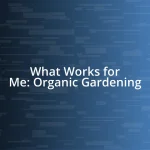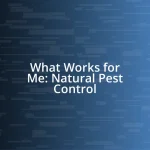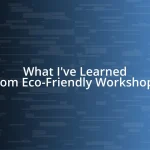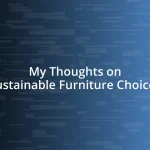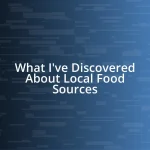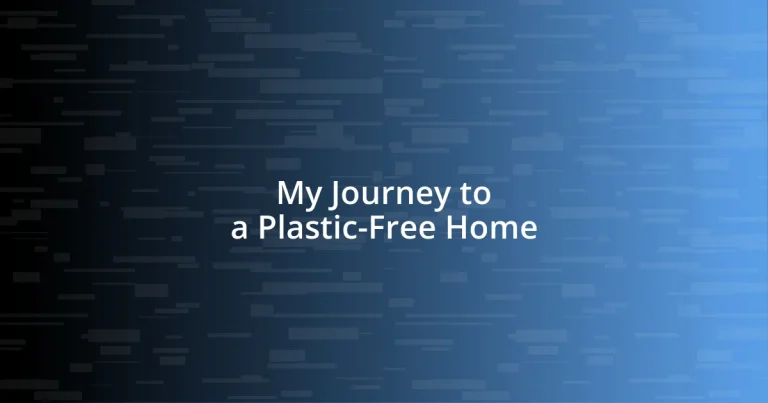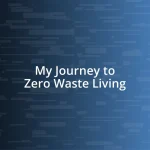Key takeaways:
- Plastic pollution is pervasive and affects ecosystems, food chains, and marine life, motivating individuals to reduce their plastic usage.
- Identifying and adopting sustainable alternatives, such as glass containers and bamboo toothbrushes, can significantly reduce household plastic waste.
- Sharing personal journeys and encouraging community engagement, through events or challenges, fosters collective action towards a plastic-free lifestyle.

Understanding plastic pollution’s impact
Plastic pollution profoundly affects our environment, infiltrating every corner of our planet. I still remember a beach trip where I was struck by the sheer amount of plastic debris washing ashore. It made me wonder, what does this mean for the marine life living in those waters?
The impact of plastic extends beyond just the visible litter; it enters ecosystems and food chains, often with dire consequences. I was shocked to learn how microplastics were found in salt and even in the food we consume regularly. Have you ever considered the implications of that? Each time we choose convenience over sustainability, we contribute to this growing issue.
Emotionally, it feels heavy to think about the long-term effects that plastic pollution has on wildlife and future generations. I couldn’t help but feel a pang of guilt as I recalled my own habits—how many single-use plastic items had I tossed aside without a second thought? It’s a hard truth to face, but understanding the impact of this crisis pushes me to act.
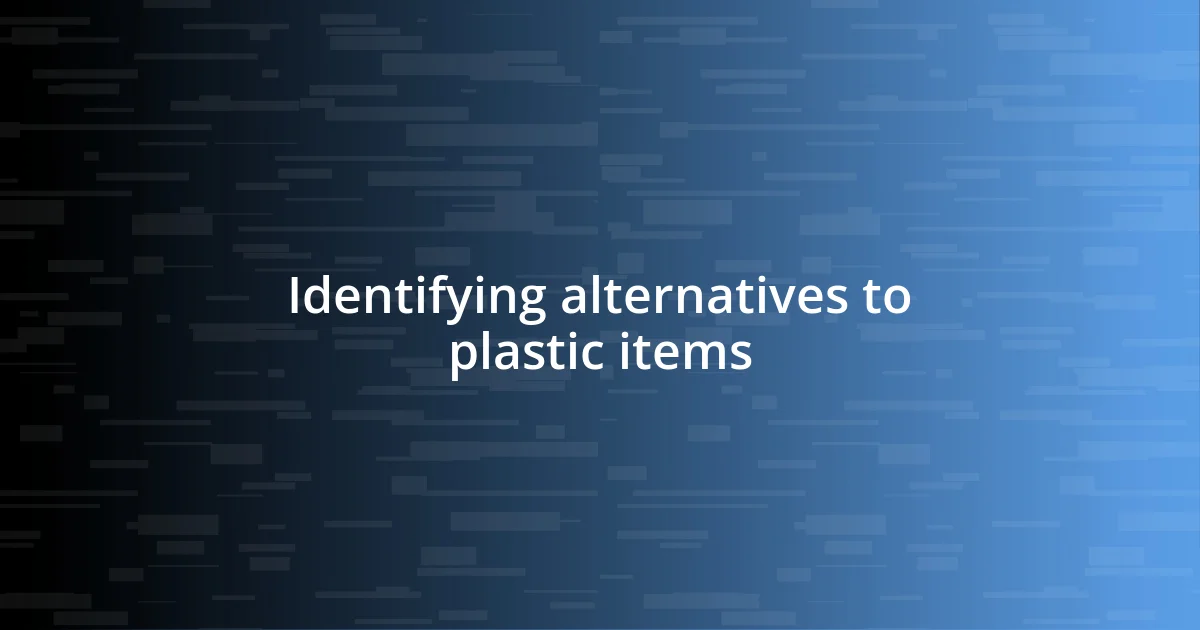
Identifying alternatives to plastic items
Finding alternatives to plastic items can feel daunting at first, but I’ve discovered that many everyday substitutes are surprisingly accessible. For instance, when I transitioned to using a bamboo toothbrush, I realized how easy it was to make a small change that had a significant impact. It’s all about exploring options that don’t compromise quality but align better with my environmental values.
Here are some alternatives I’ve found effective in my own journey:
- Glass containers instead of plastic for food storage.
- Beeswax wraps as a substitute for plastic wrap.
- Stainless steel straws that can replace single-use plastic ones.
- Cloth shopping bags to ditch plastic grocery bags.
- Natural fibers like jute or hemp for packaging instead of synthetic materials.
- Wooden or metal utensils to use instead of plastic cutlery on the go.
Making these swaps not only gives me a sense of satisfaction but also significantly reduces the amount of plastic in my home. Each small change is a step toward a cleaner, healthier environment.
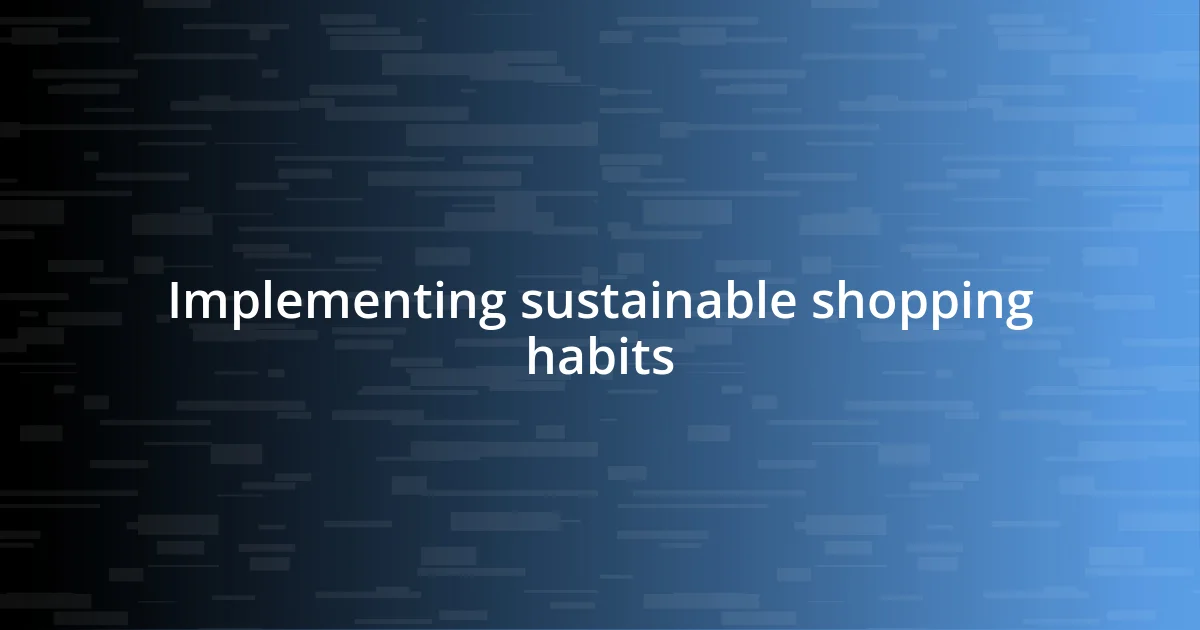
Implementing sustainable shopping habits
Sustainable shopping habits are at the heart of my journey toward a plastic-free home. I remember the first time I walked into a store focused on zero-waste products. It felt exhilarating to explore aisles filled with jars of bulk grains, spices, and even personal care items – all without plastic packaging! By bringing my reusable bags and jars, I felt empowered every time I left with a new set of essentials that were good for me and the planet.
It’s equally important to prioritize local shopping. I’ve formed a deeper connection with my community since I started sourcing fresh produce from local farmers’ markets. Supporting local vendors not only reduces transportation emissions but also encourages a healthier lifestyle. I recall chatting with a local farmer and learning about sustainable farming practices, which made me feel more connected to the food I consume. It’s an enriching experience that amplifies the joy of eating seasonally.
In essence, embracing sustainable shopping habits has led to an overall shift in how I view consumption. I now ask myself, “Is this item truly necessary?” or “How will this affect the environment?” This conscious mindset transforms shopping into a meaningful activity, rather than a routine chore. Making each choice count is a rewarding part of my plastic-free journey.
| Sustainable Shopping Habit | Description |
|---|---|
| Bulk Shopping | Buying in bulk reduces packaging waste and allows for custom quantities. |
| Local Markets | Purchasing from local vendors supports sustainable practices and reduces carbon footprint. |
| Mindful Consumption | Reflecting on the necessity of each purchase fosters responsible consumption. |
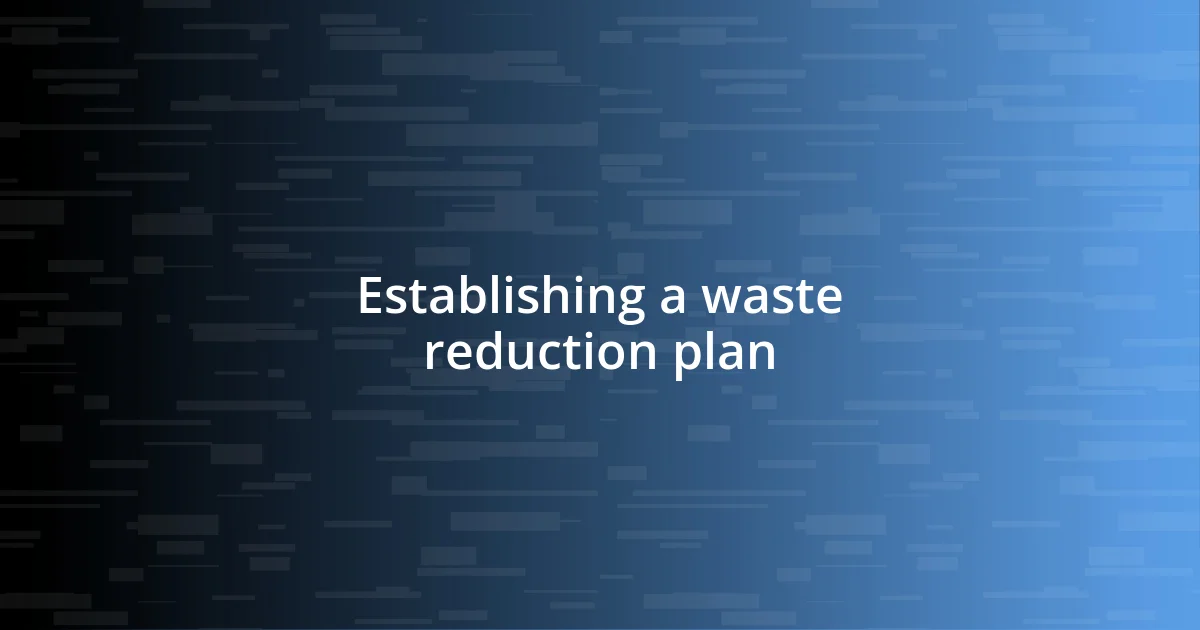
Establishing a waste reduction plan
Establishing a waste reduction plan has been a transformative experience for me. It started with a simple goal: to minimize the amount of waste my household produced. I remember sitting down with a notebook, sketching out areas where I could cut back. Analyzing my grocery habits opened my eyes to the piles of unnecessary packaging that made their way into my kitchen.
One of the first steps I took was to track my waste for a week. I wanted to understand what I was throwing away and why. Was it excessive packaging? Expired food? By identifying patterns, I realized how essential planning was. Each shopping trip became an opportunity to rethink what I truly needed and how I could substitute or refuse items that generated waste.
As I mapped out my plan, I found it helpful to set specific monthly goals. For instance, I aimed to reduce my food waste by a certain percentage or eliminate a specific type of plastic from my home altogether. Celebrating small victories, like reducing my reliance on plastic wraps or bags, filled me with a sense of accomplishment. It’s about progress, not perfection, and each little change motivates me to keep striving for a more sustainable lifestyle. Have any goals inspired you lately?
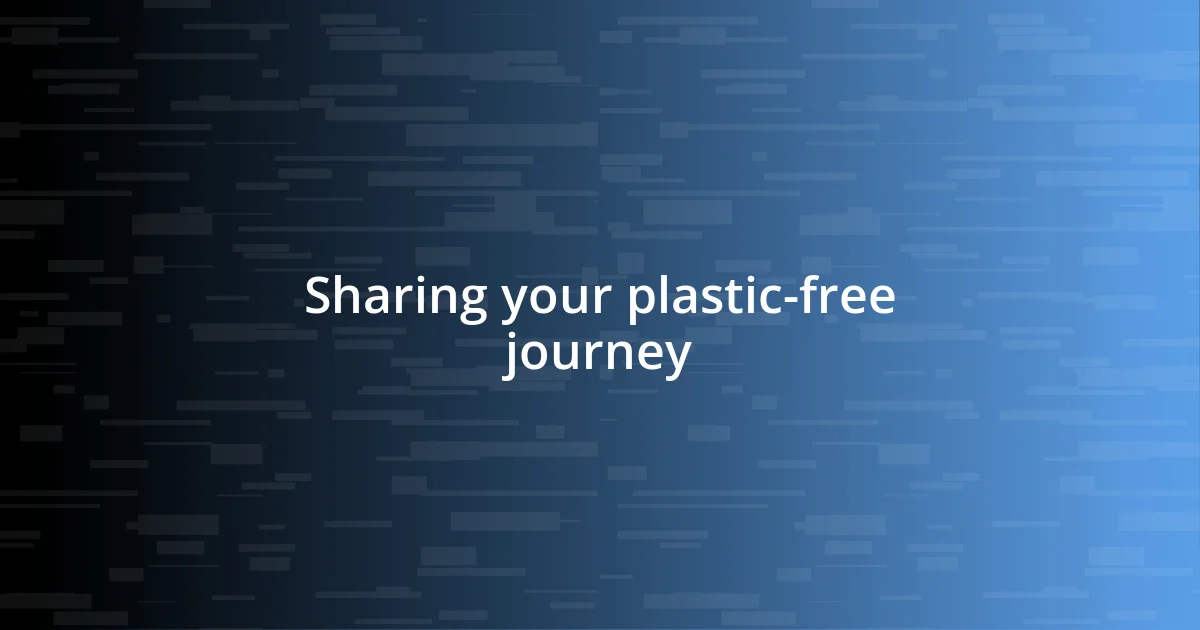
Sharing your plastic-free journey
Sharing my plastic-free journey has undeniably opened up new avenues for connection and inspiration. I often find joy in documenting my experiences on social media, sharing photos of my sustainable finds and tips. Just the other day, a friend reached out after seeing one of my posts, asking for advice on how to start her own plastic-free transition. It felt incredible to know that my journey was influencing someone else’s choices! Have any moments like this propelled you to share your story?
Beyond social media, I’ve had meaningful conversations in my community about the importance of reducing plastic waste. One memorable discussion was at a local eco-event where I shared insights from my journey. Hearing others’ questions and experiences created a lovely exchange of knowledge and support. I realized that by openly discussing our challenges and triumphs, we not only encourage each other but also create a collective momentum for change. Don’t you think sharing experiences can spark more sustainable habits in those around us?
I also enjoy participating in local workshops focused on sustainability. Recently, I attended one on natural cleaning products, which was both informative and inspiring. Not only did I learn practical recipes for plastic-free alternatives, but I also connected with like-minded individuals who enriched my understanding of eco-friendly living. These shared experiences make the journey feel less isolated and more of a joint effort toward a shared goal. How have you connected with others in your sustainability pursuits?
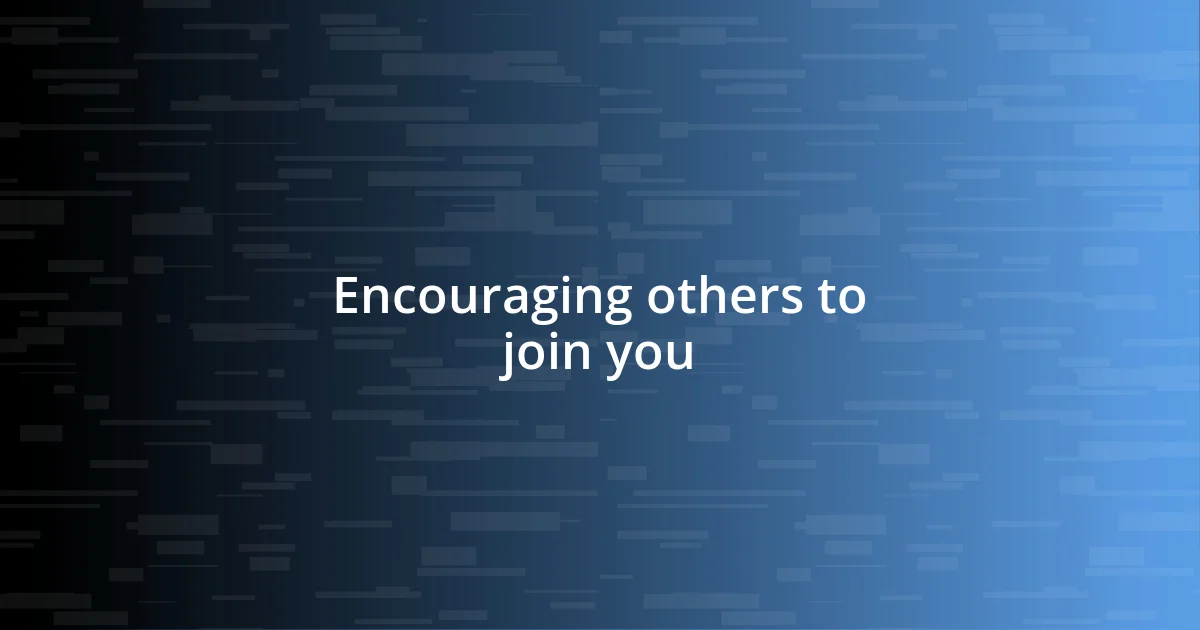
Encouraging others to join you
Encouraging others to join me on this plastic-free journey has been one of the most rewarding aspects of my experience. I remember when I invited a few neighbors over for a “plastic-free potluck.” As we gathered, we shared our favorite recipes that avoided plastic packaging and exchanged tips on where to buy bulk items. That evening, filled with laughter and creativity, sparked new conversations amongst us. Have you ever hosted a gathering that turned into a catalyst for change?
Another effective way I’ve found to inspire others is through informal challenges. Recently, I encouraged my family to go a week without single-use plastics. We made it a competition, tracking our successes and setbacks in a shared group chat. Watching them get excited over finding alternatives they never considered before was contagious! It showed me how engaging and light-hearted competition can transform the mindset of those around us. Do you think a friendly challenge could motivate your friends or family to reassess their habits?
I also learned that leading by example holds immense power. When my colleagues noticed my reusable coffee cup and beeswax wraps, they began asking questions. Soon enough, my office started a plastic-free initiative, sharing resources and supporting each other in small changes. It ignited a sense of community, making each of us feel like we were part of something greater. Isn’t it fascinating how your own commitment can inspire a ripple effect in your social circles?
